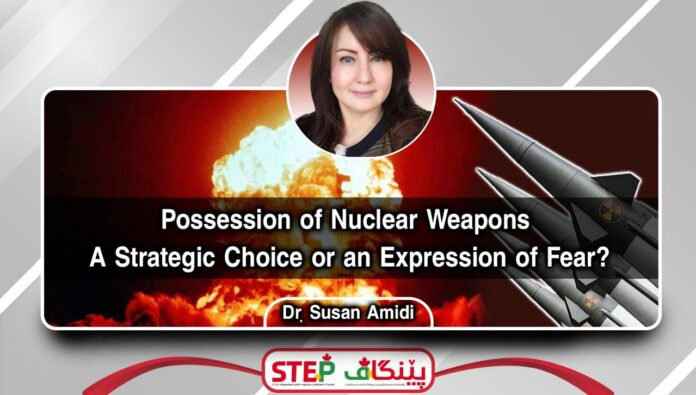Dr. Susan Amidi
In a statement that sparked widespread controversy, Ali Larijani declared that possessing nuclear weapons would be “the only option” if his country were attacked. This statement falls within the framework of nuclear deterrence strategy, which aims to prevent any aggression by threatening the use of nuclear force.
Nuclear Deterrence Strategy: Methods and Interpretations
When a state threatens to use nuclear weapons in response to an attack, this declaration can be understood in several ways:
1. Nuclear deterrence policy – A strategy used by states to ensure they are not attacked by threatening decisive nuclear retaliation.
2. Nuclear warning – A direct declaration that any aggression will be met with nuclear force, increasing regional and international tensions.
3. Inevitable nuclear response – A firm assertion that any attack will result in an immediate and devastating nuclear retaliation.
4. Official nuclear doctrine – A defined military framework outlining when and how nuclear weapons would be used.
5. Strategic escalation – Such threats may be seen as an escalatory move aimed at deterring adversaries or as an attempt to impose influence through intimidation.
These statements often lead to international tensions and can be perceived either as a serious warning or as political propaganda aimed at achieving internal or regional gains.
Is the Threat of Nuclear Weapons Driven by Fear?
This type of rhetoric may indicate fear and concern, but the extent varies depending on the political and strategic context. When a state threatens to use nuclear weapons, it may be due to:
1. Existential fear – If a state believes that any attack could threaten its survival, it may rely on nuclear threats as a necessary deterrent.
2. Concern over the adversary’s military superiority – When conventional military capabilities are insufficient to counter an enemy, nuclear threats become a means of compensating for this imbalance and creating a balance of terror.
3. Lack of trust in defensive alliances – Some states feel they cannot fully rely on their allies or conventional defense systems, prompting them to strengthen their position by threatening to use extreme force.
4. Internal instability and political pressure – Sometimes, governments escalate nuclear rhetoric as a means to distract from domestic issues or to boost their popularity by demonstrating strength to their citizens.
Between Fear and Strategy
Ultimately, the threat of nuclear weapons may be a combination of real fear and a calculated strategy aimed at achieving political and military objectives. Some states use escalatory language as a pressure tactic without genuine intent to use force, while others may perceive it as their only means of survival.
The key question remains: Does this type of rhetoric enhance security and stability, or does it increase the likelihood of catastrophic conflicts?





